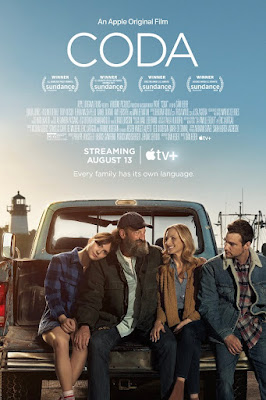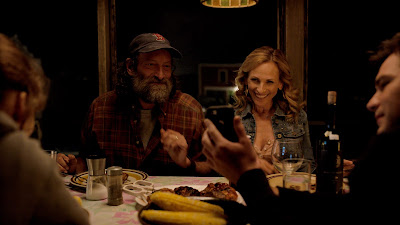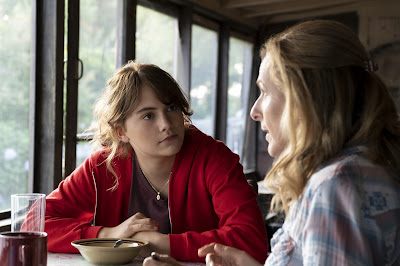Release date: August 13, 2021
Running time: 112 minutes
Written and Directed By: Siân Heder (“Tallulah,” “Little America”)
Starring: Emilia Jones (“Locke & Key”), Eugenio Derbez (“The Casagrandes”), Troy Kotsur (“The Number 23”), Ferdia Walsh-Peelo (“Vikings’), Daniel Durant (“Switched at Birth”), Amy Forsyth (“Beautiful Boy”), Kevin Chapman (“City on a Hill”), and Academy Award winner Marlee Matlin (“Children of a Lesser God”)
Seventeen-year-old Ruby (Emilia Jones) is the sole hearing member of a deaf family—a CODA, child of deaf adults. Her life revolves around acting as interpreter for her parents (Marlee Matlin, Troy Kotsur) and working on the family's struggling fishing boat every day before school with her father and older brother (Daniel Durant). But when Ruby joins her high school’s choir club, she discovers a gift for singing and soon finds herself drawn to her duet partner Miles (Ferdia Walsh-Peelo). Encouraged by her enthusiastic, tough-love choirmaster (Eugenio Derbez) to apply to a prestigious music school, Ruby finds herself torn between the obligations she feels to her family and the pursuit of her own dreams.
CODA is a special treat, a film that bridges worlds and lets the audience experience an entirely different life. Seeing this family work, interact, suffer, and love is a special experience, and I especially loved seeing how the deaf family communicated and lived their lives. The film doesn't ever point any of these insights and experiences out, rather they just exist as part of the overall storytelling. I loved seeing the alarm clocks, how they communicated, and some of the potential issues that occur when the rest of your family cannot hear. And seeing how certain things could affect someone who is deaf that a hearing person would never think twice about was fascinating to see.
And part of what makes this film so special is the cast. The main family consists of one actor who can hear and three actors who are deaf. This level of authenticity contributes greatly to the film, as everyone reacts in realistic and genuine ways. And I can't help but imagine that using deaf actors for these roles helped them to impart their own experiences into the characters and let them portray a more accurate and authentic family. There are some amazingly beautiful scenes watching this family come together or share emotions as only they can.
And I also like that the film didn't limit itself to just how this family lives, it ties into the greater issues in the community. It feels like this could connect with many small town communities or tight knit working families trying to make a living. The film treats the family's deafness as a cornerstone of their interactions, and while the issues that they face are exacerbated by their deafness, many of them are not unique to the family. From dissemination, to increasingly harsh working conditions, to trying to rethink business arrangements, the film touches on many topics that should have universal applicability.
And along those lines, CODA also feels like it is a unique journey but also one that has analogues in many other tight knit families. The need to help your family, to sometimes act as interpreter, and to choose between your passion and duty to your family should resonate with immigrant and first generation families. And the disconnect between following your passions and fulfilling your responsibilities is another universal theme that will resonate with many.
CODA is a treat for the eyes and ears, with a beautiful look at a tight knit family that faces both unique and universal challenges as they struggle to deal with life, growing together, and growing apart.
Watch it.
If you liked this review and want to see more from Watch or Pass, please consider




No comments:
Post a Comment